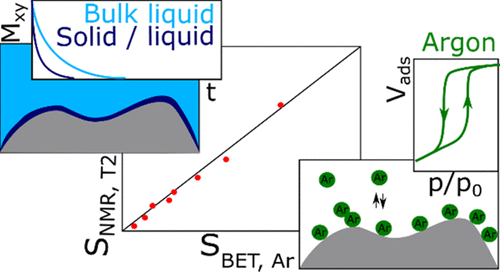377. Reliable Surface Area Assessment of Wet and Dry Nonporous and Nanoporous Particles: Nuclear Magnetic Resonance Relaxometry and Gas Physisorption
Carola Schlumberger, Lukas Sandner, Alexander Michalowski and Matthias Thommes; Langmuir (2023); DOI: 10.1021/acs.langmuir.2c03337
The reliable assessment of surface area is extremely important for many applications, e.g., catalysis, separation, and energy storage/conversion. Within this context, major progress has been made concerning the textural characterization of porous materials in the gas/dry state, e.g., gas physisorption and mercury porosimetry. However, these methods are not sufficient for the characterization of wet materials utilized in liquid-phase processes. For this, the application of nuclear magnetic resonance (NMR) relaxometry has been considered, but a systematic and rigorous assessment of the applicability of NMR relaxometry for reliable surface and pore size characterization of nanoporous materials is missing. Hence, we present a systematic study in which we assess the applicability of NMR relaxometry for reliable surface area assessment utilizing for the first time true surface area benchmark data based on argon 87 K adsorption on nonporous particles (silica and carbon black) coupled with the development of an advanced methodology including the investigation of the choice of the probe molecule and the effect of its accessibility to the pore network. Our results show that the method provides a fast (a few minutes per measurement) and reliable surface area of silica and carbon black model materials immersed in a liquid phase. In addition, our work clearly demonstrates the potential of NMR relaxometry for the targeted surface area assessment of defined pore classes (here ultramicropores) and suggests a new methodology for the characterization of pore entrances (pore window size). Furthermore, we investigate the effect of wettability and suggest that NMR relaxometry could be developed into a unique tool for assessing the wetting characteristics of adsorbate phases on pore surfaces. This fundamental study can be considered a first major step in enabling NMR relaxometry for reliable surface area assessment for wet materials, particularly relevant for materials used in processes occurring in a liquid phase.
